The beginning of the text on the G
tablet, we can assume, was designed to correlate to
the ancient time (around 65 * 71 = 13 * 355 = 4615 years
earlier), when the Full Moon was at the Heart (σ Scorpii)
and the Sun Eye was about to rise in Taurus:

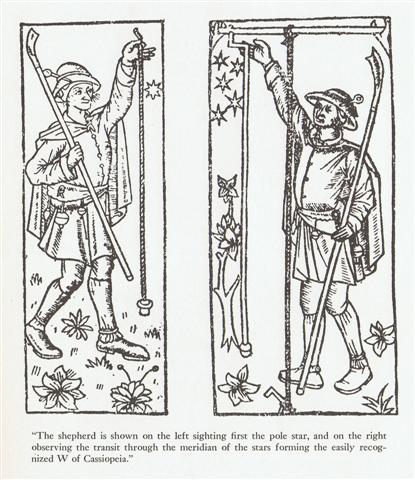
|
0h |
MARCH
22 (*1) |
23
(82) |
|
no glyph |
 |
 |
|
Ga1-1 |
Ga1-2 |
|
HYADUM II = δ¹ Tauri
(64.2) |
Net-19 |
no star listed (66) |
|
AIN
= ε Tauri, θ¹ Tauri, θ² Tauri
(65.7) |
|
May 24 |
25 (145) |
26 (*66) |
|
°May 20 |
21 (*61) |
22 (142) |
|
'April 27 |
28 (118) |
29 (*39) |
|
"April 13 |
14 (104) |
15 (*25) |
|
NAKSHATRA DATES: |
|
SEPTEMBER 20 (*183) |
21
(264) |
EQUINOX |
|
Heart-5 |
ρ
Ophiuchi (248.1),
KAJAM = ω Herculis
(248.3), χ
Ophiuchi (248.5),
SHE LOW (Market Tower) = υ Ophiuchi,
Tr. Austr. (248.7), ζ Tr. Austr. (248.8) |
Al Kalb-16
/
Jyeshtha-18 /
ANA-MUA-1 (Entrance pillar) |
|
σ Scorpii
(247.0),
HEJIAN = γ Herculis
(247.2), ψ
Ophiuchi (247.7) |
ANTARES = α Scorpii
(249.1),
MARFIK = λ Ophiuchi,
φ Ophiuchi (249.5), ω Ophiuchi (249.8) |
|
November 23 (327) |
24 |
25 (*249) |
|
19 (*243 = 3 * 3 * 3 * 3 * 3) |
°November
20 |
21 (325) |
|
'October 27 (300) |
28 |
29 (*222) |
|
"October 13 (286) |
14 |
15 (*208) |
Therefore Alcyone and Atlas in the Pleiades
ought to be with the Sun 8 days earlier, in MARCH 13
(72) - in order to be in harmony with the pattern
where Venus returned as morning star at the
horizon in the east after 8 nights of
invisibility.
|
evening star |
263 |
|
black |
8 |
|
morning star |
263 |
|
black |
50 |
|
sum |
584 |
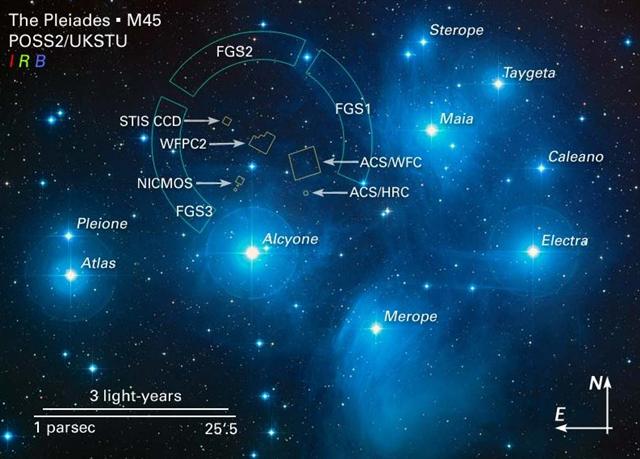
May 17 (137) + 8 = 145 (May 25).
|
MARCH 7 |
8 |
9 |
10 (*354) |
11
(70) |
12 (436) |
13 |
 |
 |
 |
 |
 |
 |
 |
|
(229 + 229) |
Gb8-18 (230) |
Gb8-19 (460) |
Gb8-20 |
Gb8-21 |
Gb8-22 |
Gb8-23 |
|
ALGENIB PERSEI = α Persei
(50.0), ο Tauri (50.2), ξ
Tauri (50.8)
GIENAH (γ Corvi)
|
σ Persei (51.6) |
no star listed (52) |
ψ Persei (53.1)
ACRUX (α CRUCIS)
|
δ Persei (54.7) |
Al Thurayya-27 /
Krittikā-3 /
Hairy Head-18 |
|
TAU-ONO
(Six Stones) |
Temennu-3 (Foundation
Stone) |
|
ATIKS = ο Persei, RANA = δ
Eridani
(55.1),
CELAENO (16 Tauri), ELECTRA
(17), TAYGETA (19),
ν Persei
(55.3),
MAIA (20), ASTEROPE (21),
MEROPE (23)
(55.6) |
ALCYONE
(56.1),
PLEIONE (28 Tauri),
ATLAS
(27)
(56.3) |
|
May 10 (*50) |
11 |
12 |
13 |
14 |
15 (500) |
16 (136) |
|
°May 6 (*46) |
7 |
8 |
9 |
10 (130) |
11 |
12 |
|
'April 13 |
4-14 |
15 |
16 (471) |
17 (107) |
18 |
19 (*29) |
|
"March 30 (454) |
31 |
"April 1 |
2 (92) |
3 |
4 (459) |
5 (*15) |
|
NAKSHATRA DATES: |
|
SEPTEMBER 6 |
7 |
8 |
9 (*172) |
10 |
11 (254) |
12 |
|
ALKALUROPS = μ Bootis
(233.1),
ED ASICH = ι Draconis
(233.2) |
NUSAKAN = β Cor. Bor.
(234.0), κ¹ Apodis (234.3),
ν Bootis (234.7) |
θ Cor. Borealis (235.3), γ
Lupi (235.6),
GEMMA = α Cor. Bor., ZUBEN
ELAKRAB = γ Librae,
QIN = δ Serpentis,
ε Tr. Austr. (235.7), μ Cor.
Borealis (235.8)
SIRRAH (α Andromedae) |
φ Bootis (236.2), ω Lupi
(236.3), ψ¹ Lupi (236.7), ζ
Cor. Borealis (236.9) |
ι Serpentis (237.4), ψ²
Lupi, ρ Oct. (237.5), γ Cor.
Borealis (237.7),
COR
SERPENTIS = α Serpentis
(237.9) |
π Cor. Borealis,
UNUK ELHAIA = λ Serpentis
(238.1),
CHOW = β Serpentis
(238.6) |
κ Serpentis (239.3), δ Cor.
Borealis,
TIĀNRŪ = μ Serpentis
(239.5), χ Lupi, (239.6), ω
Serpentis (239.7),
BA = ε Serpentis,
χ Herculis (239.8). κ Cor.
Borealis, ρ Serpentis
(239.9) |
|
November 9 |
10 (314) |
11 |
12 (*236) |
13 |
14 |
15 |
|
°November 5 (*329) |
6 (310) |
7 |
8 |
9 |
10 |
11 |
|
'October 13 |
14 |
15 (288) |
16 |
17 (*210) |
18 |
19 |
|
"September 29 |
30 (*193) |
"October 1 |
2 (275) |
3 |
4 |
5 |
|
3-14 (73) |
MARCH 15 |
16 (440) |
17 |
18 |
19 |
20 (*364) |
 |
 |
 |
 |
 |
 |
 |
|
Gb8-24 (465) |
Gb8-25 |
Gb8-26 |
Gb8-27 |
Gb8-28 |
Gb8-29 |
Gb8-30 (242) |
|
MENKHIB = ζ Persei
(57.6)
PORRIMA (γ Virginis)
|
ZAURAK = γ Eridani
(58.9) |
λ Tauri (59.3), ν Tauri (59.9) |
4h (60.9) |
υ Persei (61.2) |
BEID = ο¹ Eridani
(62.2), μ Persei (62.8)
VINDEMIATRIX ( ε Virginis) |
Al Dabarān-2 |
|
JĪSHUĬ = λ Persei
(60.7)
COR
CAROLI (α Canum Ven.)
|
HYADUM I = γ Tauri
(63.4) |
|
May 17 (137) |
18 (*58) |
19 (*424) |
20 |
21 |
22 |
23 (*428) |
|
°May 13 |
14 (*54) |
15 (*420) |
16 (136) |
17 |
18 (*58) |
19 (*424) |
|
'April 20 |
21 (111) |
22 |
23 |
24 |
25 (*400) |
26 (*36) |
|
"April 6 |
7 |
8 |
9 (464) |
10 (100) |
11 |
12 (*22) |
|
NAKSHATRA DATES: |
|
SEPTEMBER 13 |
14 (*177) |
15 |
16 |
17 (260) |
18 |
19 |
|
β
Tr. Austr. (240.3), κ Tr. Austr.
(240.4), ρ Scorpii (240.8) |
Iklīl al Jabhah-15 /
Anuradha-17 /
Room-4 |
υ
Herculis (242.3), ρ Cor.
Borealis (242.4), ι Cor.
Borealis (242.5), θ Draconis
(242.6), ξ Scorpii (242.7)
SCHEDIRr (α Cassiopeiae)
|
16h (243.5) |
ψ
Scorpii (244.6),
LESATH = ν Scorpii
(244.8) |
χ
Scorpii (245.1),
YED PRIOR = δ Ophiuchi,
δ Tr. Austr. (245.5) |
YED POSTERIOR = ε Ophiuchi,
RUKBALGETHI SHEMALI = τ Herculis
(246.6). δ Apodis (246.7), ο
Scorpii (246.8) |
|
ξ
Lupi, λ Cor. Bor.(241.1), Zheng
(241.2),
VRISCHIKA = π Scorpii
(241.3), ε Cor. Borealis
(241.5),
DSCHUBBA
= δ Scorpii
(241.7), η Lupi (241.9) |
ACRAB = β Scorpii, JABHAT AL
ACRAB = ω Scorpii
(243.3), θ Lupi,
RUTILICUS = β Herculis
(243.5),
MARFIK = κ Herculis
(243.7), φ Herculis (243.8) |
|
November 16 |
17 |
18 (*242) |
19 |
20 |
21 |
22 (326) |
|
°Nov 12 (*236) |
13 |
14 |
15 |
16 (*240) |
17 |
18 (322) |
|
'October 20 |
21 (*214) |
22 (295) |
23 |
24 |
25 |
26 (299) |
|
"October 6 |
7 (*200) |
8 |
9 |
10 |
11 |
12 (285) |
At the time of rongorongo the
heliacal positions were around 64 (= 8 * 8) days
different, MARCH 13 (72) + 64 = 136 (May 16).
And 8 weeks before
May 16 (136) was March 21 (80) - where we have found Rogo:
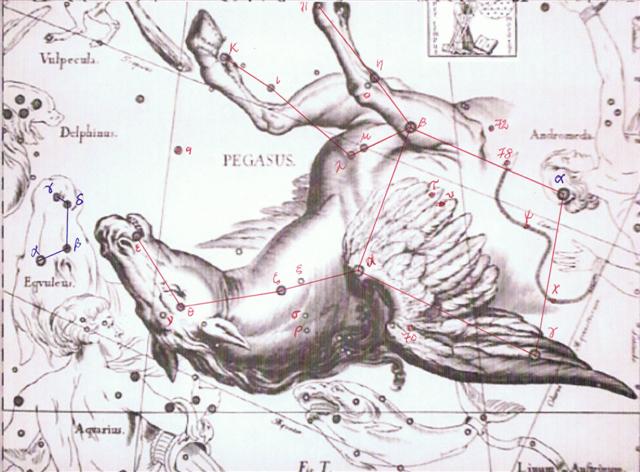
|
JANUARY 15 (*300) |
16 |
17 |
18 (383) |
 |
 |
 |
 |
|
Gb6-25 (229
+ 178) |
Gb6-26 (408) |
Gb6-27 (180) |
Gb6-28 |
|
θ Oct. (364.4) |
Al
Fargh al Thāni-25 |
Uttara Bhādrapadā-27
/
Wall-14 |
χ Pegasi (2.1),
θ Andromedae
(2.7) |
|
0h (365.25) |
ο Oct. (1.3),
ALGENIB PEGASI
= γ
Pegasi
(1.8) |
|
CAPH = β Cassiopeiae,
SIRRAH
= α Andromedae
(0.5), ε Phoenicis, γ³ Oct. (0.8) |
|
March 20 |
21 (0h) |
22 (*1) |
23 (82) |
|
°March 16 (*360) |
17 |
18 (77) |
19 |
|
'February 21 (52) |
22 (418) |
TERMINALIA |
24 (*340) |
|
"February 7 (403) |
8 (*324) |
9 (40) |
10 |
|
NAKSHATRA DATES: |
|
JULY
17 (*118) |
18 |
19
(200) |
20 |
|
12h (182.6) |
ALCHITA
= α Corvi, MA WEI (Tail of the
Horse) = δ Centauri
(183.1),
MINKAR = ε Corvi
(183.7), ρ Centauri (183.9) |
PÁLIDA = δ Crucis
(184.6),
MEGREZ = δ Ursae Majoris
(184.9) |
Hasta-13 /
Chariot-28 |
|
ο Virginis
(182.1), η Crucis (182.5) |
GIENAH = γ Corvi
(185.1),
ε Muscae
(185.2), ζ Crucis (185.4),
ZANIAH = η Virginis
(185.9) |
|
September 19 (*182) |
20 |
21 (264) |
EQUINOX |
|
°September 15 (*178) |
16 |
17 (260) |
18 |
|
'August 23 (*155) |
24 (236) |
25 |
26 |
|
"August 9 (*141) |
10 (222) |
11 |
12 |
Keeping the time of the Bull in
mind, however, we could alternatively relate this
location in the text
to the end of a cycle measuring 13 * 29½ days. JANUARY 18 (365 + 18 = 383)
could then be the
last night of such a cycle. Although if the Gregorian
calendar was used, then day 383 would have to be
pushed 4 glyphs ahead, to Gb7-4:
|
JANUARY 19 |
20 |
21
(*306) |
22
(387) |
 |
 |
 |
 |
|
Gb7-1 |
Gb7-2 (183) |
Gb7-3 |
Gb7-4 (414) |
|
σ Andromedae
(3.0), ι Ceti (3.3), ζ Tucanae (3.5),
ρ Andromedae,
π Tucanae (3.7) |
no star listed (4) |
ANKAA
= α Phoenicis,
κ Phoenicis (5.0)
ALPHARD (α
Hydrae)
|
λ Phoenicis (6.3), β Tucanae (6.4) |
|
March 24 (*3) |
25 (84) |
26 (*370) |
27 (451) |
|
°March 20 (*364) |
0h |
22 (81) |
23 |
|
'February 25 |
26 (57) |
27 (*343) |
28 (424) |
|
"February 11 |
12 (43) |
13 (*329) |
All Hearts' Day |
|
NAKSHATRA DATES: |
|
JULY
21 |
7-22
(*123) |
23 |
24
(205) |
|
CHANG SHA (Long Sand-bank) = ζ Corvi
(186.3) |
INTROMETIDA = ε Crucis
(187.4),
ACRUX
= α Crucis
(187.5) |
γ Com.
Berenicis (188.0), σ Centauri (188.1),
ALGORAB = δ Corvi
(188.5),
GACRUX = γ Crucis
(188.7)
|
γ Muscae
(189.0),
AVIS SATYRA = η Corvi
(189.3),
ASTERION = β Canum Ven.
(189.5),
KRAZ = β Corvi,
κ Draconis (189.7) |
|
September 23 (*186) |
24 |
25 (268) |
26 |
|
°September 19 |
20 (*183) |
21 (264) |
EQUINOX |
|
'August 27 |
28 (240) |
29 |
30 (*162) |
|
"August 13 |
14 (226) |
15 |
16 (*148) |
Yet, the beginning of line Gb7,
with a moa crying out, ought to correspond
to JANUARY 19 (384), and because the outline of this
bird is not drawn intact we could perhaps read 'fraction'
- i.e. a sign of the difference between 384 and
13 * 29½.
 |
 |
|
moa |
Gb7-1 |
|
Moa
Poultry (general term); moa to'a,
rooster; moa taga, chicken,
moa rikiriki, chick; moa
tarapiko, old rooster (with much
twisted spurs - tara );
moa gao verapaka, chicken with
bald neck; moa va'e verevere,
with feathers on its legs; moa
pipipipi with multicoloured
spots; moa garahurahu, colour
of dark ashes; moa tea,
white; moa totara, frizzy;
moa tu'a ivi raá, with bright
yellow back. Vanaga.
Fowl; moa toa,
cock; moa uha, hen; moa
ohoa, crowing of cocks; moa
manua, wild fowl; moa herea,
tame fowl. P Pau.: moa,
domestic fowl. Mgv.: moa,
cock. Mq.: moa, hen. Ta.:
moa, cock, hen. Churchill.
Mgv.: Aka-moa,
to cook. Mq.: haamoa, id.
To.: moa, dried. Ha.: moa,
to dry, to roast. Mgv.: Moaga,
1. a red beard. Mq.: moaka,
very red. 2. a fish. Mq.: moana,
id. Sa.: moaga, id. Ha.:
moana, a red fish. Mgv.:
Moake, east wind. Ha.: moae,
the northeast tradewind. Churchill. |

And then we have to consider the
dates at the time of Bharani (a place of
birth), which in the round Dendera zodiac was marked by an encircled
right wedjat eye:
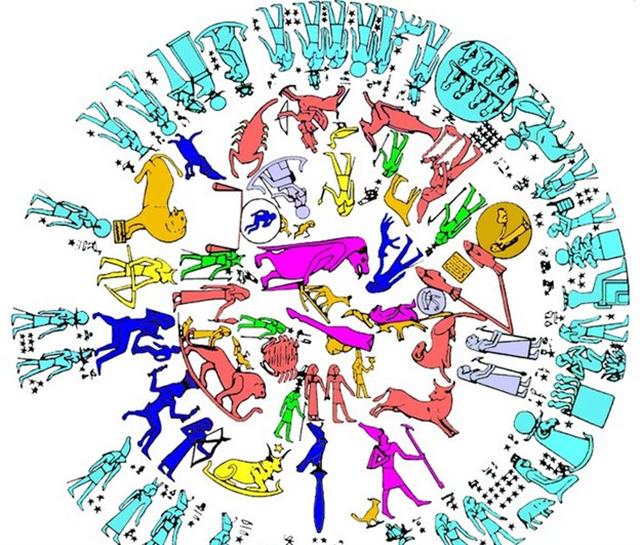
|
ARIES: |
|
1 |
Ashvini |
β and γ Arietis |
Horse's head |
27 = 16
+ 11 |
|
wife of the Ashvins |
Sheratan and Mesarthim |
April 17 (107) |
|
2 |
Bharani |
35, 39, and 41 Arietis |
Yoni, the female organ of
reproduction |
41 = 27
+ 14 |
|
the bearer |
Musca Borealis |
May 1 (121) |
|
TAURUS: |
|
3 |
Krittikā |
M 45 Tauri |
Knife or spear |
55 = 41
+ 14 |
|
the nurses of Kārttikeya |
The Pleiades |
May 15 (135) |
|
4 |
Rohini |
α Tauri |
Cart or chariot, temple, banyan tree |
68 = 55
+ 13 |
|
the red one |
Aldebaran |
May 28 (148) |
|
JANUARY 15 (*300) |
16 |
17 |
18 (383) |
 |
 |
 |
 |
|
Gb6-25 (229
+ 178) |
Gb6-26 (408) |
Gb6-27 (180) |
Gb6-28 |
|
θ Oct. (364.4) |
Al
Fargh al Thāni-25 |
Uttara Bhādrapadā-27
/
Wall-14 |
χ Pegasi (2.1),
θ Andromedae
(2.7) |
|
0h (365.25) |
ο Oct. (1.3),
ALGENIB PEGASI
=
γ Pegasi
(1.8) |
|
CAPH = β Cassiopeiae,
SIRRAH
= α Andromedae
(0.5), ε Phoenicis, γ³ Oct. (0.8) |
|
March 20 |
21 (0h) |
22 (*1) |
23 (82) |
|
°March 16 (*360) |
17 |
18 (77) |
19 |
|
'February 21 (52) |
22 (418) |
TERMINALIA |
24 (*340) |
|
"February 7 (403) |
8 (*324) |
9 (40) |
10 |
|
NAKSHATRA DATES: |
|
JULY
17 (*118) |
18 |
19
(200) |
20 |
|
12h (182.6) |
ALCHITA
= α Corvi, MA WEI (Tail of the
Horse) = δ Centauri
(183.1),
MINKAR = ε Corvi
(183.7), ρ Centauri (183.9) |
PÁLIDA = δ Crucis
(184.6),
MEGREZ = δ Ursae Majoris
(184.9) |
Hasta-13 /
Chariot-28 |
|
ο Virginis
(182.1), η Crucis (182.5) |
GIENAH = γ Corvi
(185.1),
ε Muscae
(185.2), ζ Crucis (185.4),
ZANIAH = η Virginis
(185.9) |
|
September 19 (*182) |
20 |
21 (264) |
EQUINOX |
|
°September 15 (*178) |
16 |
17 (260) |
18 |
|
'August 23 (*155) |
24 (236) |
25 |
26 |
|
"August 9 (*141) |
10 (222) |
11 |
12 |
|
JANUARY 19 |
20 |
21
(*306) |
22
(387) |
 |
 |
 |
 |
|
Gb7-1 |
Gb7-2 (183) |
Gb7-3 |
Gb7-4 (414) |
|
σ Andromedae
(3.0), ι Ceti (3.3), ζ Tucanae (3.5),
ρ Andromedae,
π Tucanae (3.7) |
no star listed (4) |
ANKAA
= α Phoenicis,
κ Phoenicis (5.0)
ALPHARD (α
Hydrae)
|
λ Phoenicis (6.3), β Tucanae (6.4) |
|
March 24 (*3) |
25 (84) |
26 (*370) |
27 (451) |
|
°March 20 (*364) |
0h |
22 (81) |
23 |
|
'February 25 |
26 (57) |
27 (*343) |
28 (424) |
|
"February 11 |
12 (43) |
13 (*329) |
All Hearts' Day |
|
NAKSHATRA DATES: |
|
JULY
21 |
7-22
(*123) |
23 |
24
(205) |
|
CHANG SHA (Long Sand-bank) = ζ Corvi
(186.3) |
INTROMETIDA = ε Crucis
(187.4),
ACRUX
= α Crucis
(187.5) |
γ Com.
Berenicis (188.0), σ Centauri (188.1),
ALGORAB = δ Corvi
(188.5),
GACRUX = γ Crucis
(188.7)
|
γ Muscae
(189.0),
AVIS SATYRA = η Corvi
(189.3),
ASTERION = β Canum Ven.
(189.5),
KRAZ = β Corvi,
κ Draconis (189.7) |
|
September 23 (*186) |
24 |
25 (268) |
26 |
|
°September 19 |
20 (*183) |
21 (264) |
EQUINOX |
|
'August 27 |
28 (240) |
29 |
30 (*162) |
|
"August 13 |
14 (226) |
15 |
16 (*148) |
... On February 9 the Chorti Ah K'in,
'diviners', begin the agricultural year.
Both the 260-day cycle and the solar year
are used in setting dates for religious and
agricultural ceremonies, especially when
those rituals fall at the same time in both
calendars.
The ceremony begins when the diviners go to
a sacred spring where they choose five
stones with the proper shape and color.
These stones will mark the five positions of
the sacred cosmogram created by the ritual.
When the stones are brought back to the
ceremonial house, two diviners start the
ritual by placing the stones on a table in a
careful pattern that reproduces the
schematic of the universe. At the same time,
helpers under the table replace last year's
diagram with the new one. They believe that
by placing the cosmic diagram under the base
of God at the center of the world they
demonstrate that God dominates the universe.
The priests place the stones in a very
particular order. First the stone that
corresponds to the sun in the eastern,
sunrise position of summer solstice is set
down; then the stone corresponding to the
western, sunset position of the same
solstice. This is followed by stones
representing the western, sunset position of
the winter solstice, then its eastern,
sunrise position. Together these four stones
form a square. They sit at the four corners
of the square just as we saw in the Creation
story from the Classic period and in the
Popol Vuh. Finally, the center stone is
placed to form the ancient five-point sign
modern researchers called the quincunx
If there was one stone
fetched per day,
brought from the sacred spring, then
"February 13 could have corresponded to the
last of these 5 stones and also to the
little child (tama-iti):
 |
 |
|
tamaiti |
Gb7-3 (184) |
|
Tama
1. Shoot (of
plant), tama miro, tree
shoot; tama tôa, shoot of
sugarcane. 2. Poles, sticks,
rods of a frame. 3. Sun rays. 4.
Group of people travelling in
formation. 5. To listen
attentively (with ear,
tariga, as subject, e.g.
he tama te tariga);
e-tama rivariva tokorua tariga
ki taaku kî, listen
carefully to my words.
Tamahahine, female.
Tamahine (= tamahahine),
female, when speaking of
chickens: moa tamahine,
hen. Tamâroa, male.
Vanaga.
1. Child. P
Pau.: tama riki, child.
Mgv.: tama, son,
daughter, applied at any age.
Mq.: tama, son, child,
young of animals. Ta.: tama,
child. Tamaahine (tama
1 - ahine), daughter,
female. Tamaiti, child P
Mq.: temeiti, temeii,
young person. Ta.: tamaiti,
child. Tamaroa, boy,
male. P Mgv.: tamaroa,
boy, man, male. Mq.: tamaóa,
boy. Ta.: tamaroa, id. 2.
To align. Churchill.
In the
Polynesian this [tama na,
father in the Efaté language] is
distinguished from táma
child by the accent tamā
or by the addition of a final
syllable which automatically
secures the same incidence of
the accent, tamái,
tamana
... Churchill 2 |
And the first of these
foundation stones would have corresponded to
"February 9 when Algenib Pegasi (γ) rose
with the Sun.
|
Throwing stick? |
 |
Phoenician
gimel |
 |
Greek gamma |
Γ (γ) |
|
... In its
unattested Proto-Canaanite
form, the letter [gimel]
may have been named after a
weapon that was either a
staff sling or a throwing
stick, ultimately deriving
from a Proto-Sinaitic glyph
... Bertrand Russell posits
that the letter's form is a
conventionalized image of a
camel. The letter may be the
shape of the walking
animal's head, neck, and
forelegs. Barry B. Powell, a
specialist in the history of
writing, states 'It is hard
to imagine how gimel
= 'camel' can be derived
from the picture of a camel
... The word gimel is
related to gemul,
which means 'justified
repayment', or the giving of
reward and punishment.
The Swedish
word gammal means
'old' (and dry like a
stick).
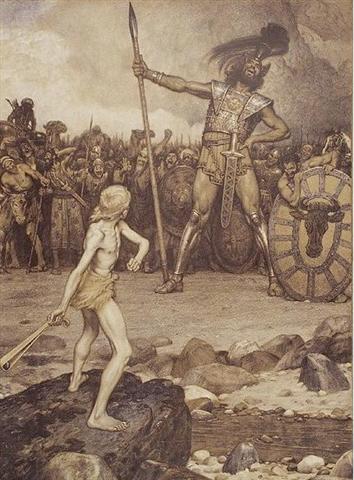 |
When the quincunx had been
completed came All Hearts' Day in "February 14
(2-14), where the old cosmogram would have
been swept away:

Before Goliath was killed he
had stood there for 40 days waiting for
some eneny to spear. "February 9 was day
40 counted from "January 1.
|

















